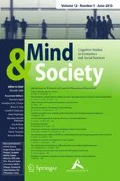Abstract
In this paper, we claim that the problem of conditionals should be dealt with by carefully distinguishing between thinking conditional propositions and conditional thinking, i.e. thinking on the basis of some supposition. This distinction deserves further investigation, if we are to make sense of some old and new experimental data concerning the understanding and the assertion of conditional sentences. Here we will argue that some of these data seem to refute the mental models theory of conditional reasoning, setting the ground for a different approach to the cognitive study of conditionals.


Similar content being viewed by others
Notes
Ours will be a Popperian approach: we will take into account some hypotheses that are suggested, without being proved, by empirical data, and we will defend their plausibility by arguing that they can explain some features and phenomena that other accounts do not manage to explain.
From a Popperian perspective, the existentially quantified hypothesis that some conditionals are understood without being totally defined is unfalsifiable, but it could be proved; if proved (as indeed it seems possible), its negation would be falsified, a relevant result in itself.
Asserting that there are alternative implicit models representing conditionals with a false antecedent implies asserting that the conditional can be considered true in cases where the antecedent is false. The evaluation of the false-antecedent cases would be less immediate than the evaluation of the true-antecedent case, because it deals with implicit models. In other words, the theory does not set any constraint concerning the possibility to evaluate conditionals; it simply posits that in some cases—the false-antecedent cases—the evaluation is harder, because those cases are less accessible to cognition than the true-antecedent case. From this perspective, Johnson-Laird’s account of conditionals’ comprehension is not very different from the typical view of reasoning errors proposed by mental-rules theories. Actually, Lance Rips in Psychology of Proof (1994) states that: «people are not always successful in producing a mental proof [...] for every deductively correct argument (relative to some logic system). They may not possess or may not be able to apply an inference rule that is crucial for a particular proof. Resource limitations—for example, capacity restrictions in working memory—may keep them from completing a proof» (Rips 1994, p. 103). That is, according to Rips it is possible that some rule is not immediately available, in much the same way as, according to Johnson-Laird, reasoning errors occur when people forget about the existence of implicit models.
Not in every circumstance. If it is known that Paolo is always in Milano, and with it the thought that he may go or stay in Padova cannot be entertained, then the statement is perceived as weird, and, possibly, it would not be asserted.
Precisely, conditional sentences that represent propositions.
Of course, the commitment to A given B is compatible with the commitment to A given C, and one of them can be made void without making void the other.
The specification and the development of these ideas are left for another occasion.
References
Edgington D (1995) On conditionals. Mind 104:235–329
Edgington D (2001) Conditionals. Stanford encyclopedia of philosophy. http://www.plato.stanford.edu/entries/conditionals/
Edgington D (2003) What if? Questions about conditionals. Mind Lang 18:380–401
Evans JStBT (1972) Interpretation and matching bias in a reasoning task. Q J Exp Psychol 24:193–199
Evans JStBT, Handley SH, Over DE (2003) Conditionals and conditional probability. J Exp Psychol Learn 29:321–335
Evans JStBT, Newstead SE (1977) Language and reasoning: a study of temporal factors. Cognition 5:265–283
Johnson-Laird PN (2000) Perché la logica non è un buon modello del ragionamento. In Cherubini P, Giaretta P, Mazzocco A (eds) Ragionamento: psicologia e logica. Giunti, Firenze, pp 109–135
Johnson-Laird PN, Byrne RMJ (1991) Deduction. Lawrence Erlbaum Associates, Hillsdale
Johnson-Laird PN, Byrne RMJ (2002) Conditionals: a theory of meaning, pragmatics, and inference. Psychol Rev 109:646–678
Lewis D (1976) Probabilities of conditionals and conditional probabilities. Philos Rev 95:581–589
Over DE, Evans JStBT (2003) The probability of conditionals: the psychological evidence. Mind Lang 18:340–358
Quine WVO (1952) Methods of logic. Routledge, London
Ramsey FP (1990) General propositions and causality (original publications, 1931). In: Mellor DH (ed) Philosophical Papers. Cambridge University Press, Cambridge, pp 145–163
Rips LJ (1994) The psychology of proof. MIT Press, Cambridge
Wason PC (1966) Reasoning. In: Foss BM (ed) New horizons in psychology. Penguin Books, Harmondsworth, pp 106–137
Acknowledgments
This article is a revised version of the paper presented at the Second European Conference Computing and Philosophy (E-CAP2004), held at the University of Pavia, Italy (3–5 June 2004) and chaired by Lorenzo Magnani.
Author information
Authors and Affiliations
Corresponding author
Rights and permissions
About this article
Cite this article
Manfrinati, A., Giaretta, P. & Cherubini, P. Conditionals and conditional thinking. Mind & Society 7, 21–34 (2008). https://doi.org/10.1007/s11299-007-0032-8
Received:
Accepted:
Published:
Issue Date:
DOI: https://doi.org/10.1007/s11299-007-0032-8



